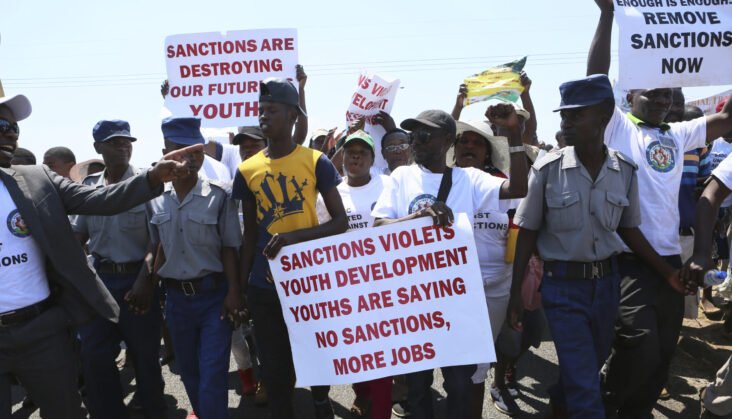
Police escort some hundreds of people marching on the streets of Harare, Friday, Oct, 25, 2019, in protest over US sanctions that the Zimbabwean government blames for the country’s worsening economic problems. (AP/Tsvangirayi Mukwazhi)
In Zimbabwe, the US elections were closely monitored with a euphoria gripping many who were hoping to see the Democratic party come out a winner and impose changes that will ultimately improve the lives of Zimbabweans who have been suffering from years of political and economic decay.
“We hope that the President Biden will work closely to call for the removal of sanctions in Zimbabwe as well as hold our leader to account over the crimes against humanity that the administration has committed over the past two years,” says Leonard Zivhu, a Political Science student, at the University of Zimbabwe.
To the Zimbabwean people, the transition of power from the Republican to Democratic party would ideally force the US to call on Zimbabwe to order and address the challenges of human rights atrocities, corruption, bad governance affecting the country in the second republic under President Emmerson Mnangangwa.
Political analysts in Zimbabwe told The Africa Report that Zimbabweans watched with keen interest the unfolding of the US elections, with the ultimate hope that the new Biden administration will finally intervene in their country. But it’s an unrealistic hope: “The United States policy is not a one-man band, the president on his own cannot determine policy over Zimbabwe,” says Enerst Mudzengi, director of Media Center, a local non-governmental organisation, and an independent political analyst.
Improve Zimbabwe’s economy: Sanctions & Foreign Direct Investment
The United States Congress in 2001 passed the Zimbabwe Democracy and Economic Recovery Act (ZDERA), which restricts US support for multilateral financing to Zimbabwe until it follows through on specific political and economic reforms.
Zimbabweans must not expect that the president elect will be the better devil when he was one of the proponents of ZDERA.
ZDERA was passed during former president Robert Mugabe administration’s undemocratic practices, human rights abuses and economic mismanagement.
President Biden was part of Congress when ZDERA was passed, so many wonder what can Zimbabweans expect under his administration.
Linda Masarira, the leader of the Labour Economic African Democrats (LEAD), an independent political party, says Biden was one of the advocates of ZDERA and the foreign policy of US will not change; regardless of who is president: “Whether it is the Democrats or Republicans in power in the US, they will never change their stance on Zimbabwe. Zimbabweans must not expect that the president elect will be the better devil when he was one of the proponents of ZDERA.”
But Mudzengi adds: “Without comprehensive economic and political reforms, it may be difficult to assume that the United States can change their relations to Zimbabwe in the next four years.”
He says America’s position on achieving these reforms is very clear.
Mnangagwa’s legitimacy
As African leaders across the continent were welcoming the new president-elect through tweets, so too did Zimbabwe’s President Emerson Mnangagwa on his official twitter page.
As many Americans breathed a sigh of relief at the victory of Biden, so too did many Zimbabweans just two years ago after he came to power after the 2018 elections – the first ones held after the ousting of President Mugabe in 2017.
Many believed that Zimbabwe was finally being steered towards a new path after three decades of repression.
Instead, two-year rule has so far been blamed for human rights violations, corruption, and bad governance.
But in the two years since he’s taken over, the situation in Zimbabwe has hardly changed. There have been arrests, reported cases of human rights violations, murders, increased levels of poverty and unemployment, while Mnangagwa denies that the country is under a crisis.
Dr. Prolific Mataruse , a political science lecturer at the University of Zimbabwe says the issue of US-Zimbabwe relations in the next four years will largely depend on what the government of Zimbabwe does in terms of expectations from Washington.
African countries have to put their interests first and work towards reviving their economies without looking to the west for intervention, says Masarira. “President Donald Trump was a nationalist, if he had succeeded in winning the US elections [second term], Africa would have a chance to revive its economies and solve its problems without any interference from the US,” she adds.
Power transition, political reforms and lessons from US elections
Taking notes from the US elections, analysts point to the openness of the American electoral system.
“One thing that Zimbabwe and the whole of Africa need to learn is to have electoral practices that are predictable, institutionalised and transparent. The president in power has been complaining about rigging of the elections, a situation that cannot be conceived in Africa,” says Mudzengi.
Although the elections were held transparently, President Trump has refused to concede defeat citing vote rigging.
“The allegations being made by President Trump on vote rigging are going to have serious damage on the American reputation, how they talk to other countries on elections has been affected by the President’s Trump refusal to concede,” says Mataruse.
And for that reason, says Masarira, Africa must start defining democracy in terms of cultural and traditional values.
“In most African countries, the democratic elections are always disputable so we need to have machination that will enable us to unite and work for the common good,”she adds.
Bottom line
For Zimbabwe, the greater lesson learned from the US elections is the need to have in place a democratic political system.
“It is difficult to think of free and fair elections where you don’t have democratic political systems. Africa and Zimbabwe must first seek the democratic values, systems and culture in order for them to have free and fair elections,” says Mudzengi.


